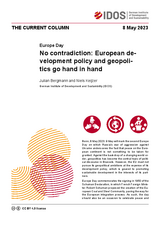Europe Day
No contradiction: European development policy and geopolitics go hand in hand
Bergmann, Julian / Niels KeijzerThe Current Column (2023)
Bonn: German Institute of Development and Sustainability (IDOS), The Current Column of 8 May 2023
Bonn, 8 May 2023. 9 May will mark the second Europe Day on which Russia’s war of aggression against Ukraine underscores the fact that peace on the European continent is not something to be taken for granted. Against the backdrop of a changing world order, geopolitics has become the central topic of political discourse in Brussels. However, the EU must not pursue its geopolitical ambitions at the expense of its development policy, which is geared to promoting sustainable development in the interests of its partners.
Europe Day commemorates the signing in 1950 of the Schuman Declaration, in which French Foreign Minister Robert Schuman proposed the creation of the European Coal and Steel Community, paving the way for the European integration process. As such, the day should also be an occasion to celebrate peace and European unity, yet the EU is having to get to grips with a new geopolitical situation involving greater confrontation between powerful players. This raises questions such as how the Union should position itself in terms of global policy, and in which alliances it should engage to this end.
What practical consequences do these geopolitical considerations have for the EU’s external action, which includes the Union’s development policy? To many in Brussels, the answer seems clear: an expansion of the EU's military capability, the reduction of economic and technological dependencies, as well as a greater focus on interests in all areas of the EU's external action. The latter is also reflected in the Global Gateway Initiative with its focus on infrastructure investment, while its contribution to EU development policy remains unclear at this time. Calls for a stronger alignment of the EU’s development policy with its own interests date back to the publication of the Global Strategy in 2016, calls that were amplified further by the launch of Ursula von der Leyen’s geopolitical Commission in December 2019. Such debates and initiatives show that the desire for greater flexibility and strategic focus in EU development policy can result in an instrumentalisation of this policy area, with other goals coming to the fore.
Nonetheless, a strong development policy geared to sustainable development is not necessarily incompatible with a stronger focus on geopolitical interests. Establishing and cultivating long-term development partnerships that are guided by the interests of partner countries is a pre-requisite for the EU being regarded as a credible and reliable player. Development policy is also an investment in the robust partnerships and alliances required to preserve the rule-based world order and maintain lasting peace.
The example of the pending reconstruction work in Ukraine illustrates the potential of development policy. While the EU has made a key contribution to providing military support to the country by means of financing arms supplies under the European Peace Facility, the Union’s long-term geopolitical influence will be gauged primarily by whether its long-term support for Ukraine’s recovery helps to bring about a stable security order in Europe and globally. Development policy plays a crucial role in this context as the central instrument for assisting Ukraine with its desired political, economic and societal transformation.
To ensure that the EU is well equipped for this enormous task, the following steps should be taken as soon as possible:
The EU should clarify how it intends to finance its contribution to Ukraine’s reconstruction without neglecting in the process its long-standing commitment and contributions to global sustainable development. The European Commission’s proposal for revising the EU’s Multi-annual Financial Framework, as announced for the second quarter, offers an opportunity to show member states the kind of financial support the EU is seeking to provide for reconstruction measures and reform processes in Ukraine beyond 2023. Providing new budgetary resources, financed by additional contributions from member states, would send out a strong signal of long-term solidarity with the country and at the same time serve as a clear indicator to other donors, such as the United States, that Europe is ready to assume a leading role in the recovery efforts.
The lack of consensus with Europe’s partners on Ukraine, including with many members of the 79-member-strong African, Caribbean and Pacific Group of States, shows that the EU’s influence in Ukraine will also depend on its ability to secure international support for its policy. Only through dedication and a solid commitment to delivering just and sustainable development by effective and appropriate means will the EU be able to retain its international credibility and maintain its global partnerships. Consequently, a flexible response to crises must not come at the expense of long-term and reliable development partnerships.
Approximately one year before EU citizens elect the next European Parliament, this year’s Europe Day shows a Union in active search of its new geopolitical role and seeking to flesh this out through measures such as the Global Gateway Initiative and the military support for Ukraine. However, the EU should avoid subordinating its development policy entirely to its foreign policy. Instead, development policy can make a major contribution to the Union’s new geopolitical alignment if it plays to its strengths, namely a long-term focus on sustainable development prospects and an emphasis on the priorities of its partners.



